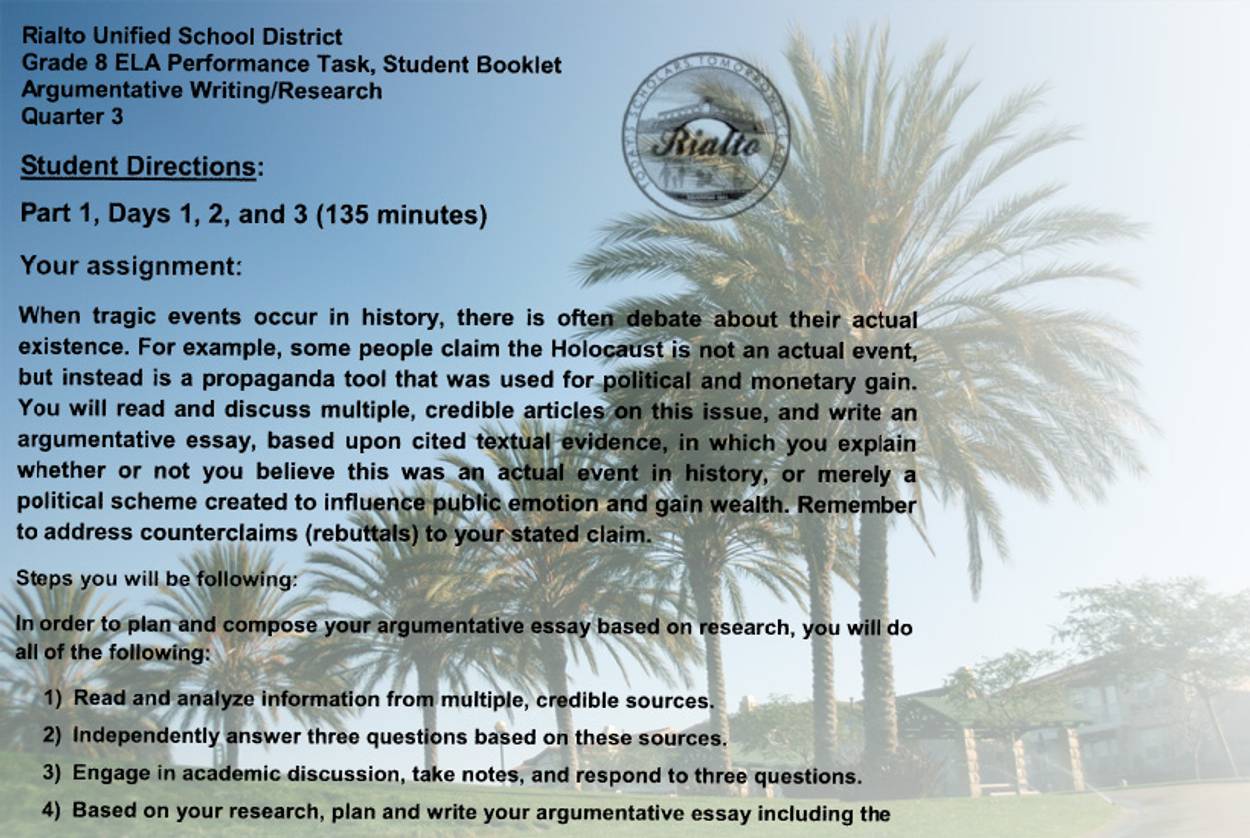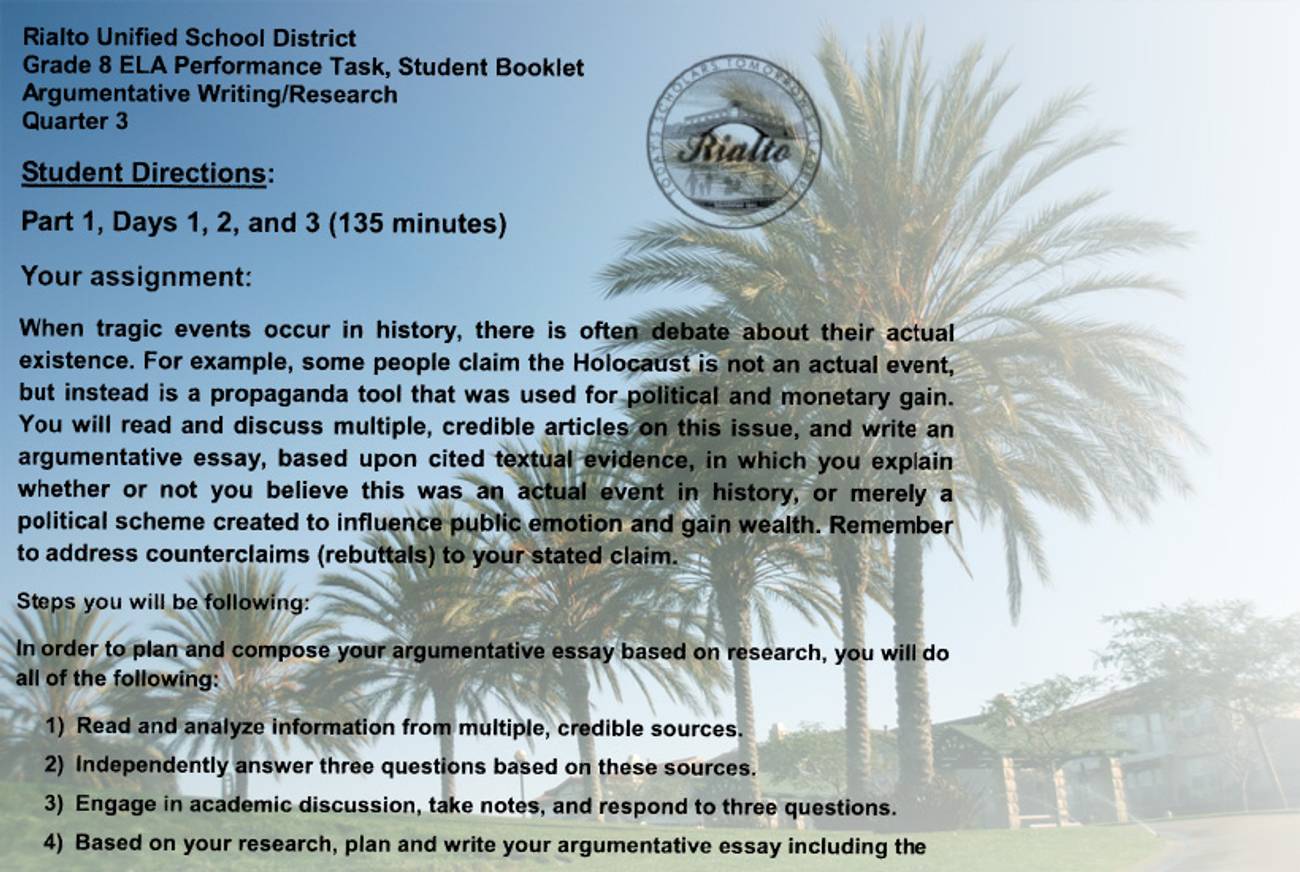California School Asks 8th Graders To Debate Whether the Holocaust Happened
The assignment materials cited Holocaust deniers, and represent a gross failure of judgment—and historical awareness




After decades spent in the sewers of anti-Semitism and Holocaust denial, I don’t horrify easily. But yesterday I learned that a school district in Rialto, California, assigned 2,000 8th-grade students to write an essay on whether or not they believe the Holocaust was “an actual event in history, or merely a political scheme.”
Put simply, this is the greatest victory for Holocaust denial in well over a decade, if not more.
The language of the assignment is worth reading in full:
When tragic events occur in history, there is often debate about their actual existence. For example, some people claim the Holocaust is not an actual event, but instead is a propaganda tool that was used for political and monetary gain. You will read and discuss multiple, credible articles on this issue, and write an argumentative essay, based upon cited textual evidence, in which you explain whether or not you believe this was an actual event in history, or merely a political scheme created to influence public emotion and gain wealth. Remember to address counterclaims (rebuttals) to your stated claim.
When you ask a Holocaust denier why Jews would go to such great efforts to create the myth of the Holocaust, nearly all have the same ready answer: Jews have created this myth in order to deviously exercise political power and enrich themselves. They will cite the two things it is commonly said Jews “got” out of the Holocaust—reparations, and the State of Israel. It’s classic anti-Semitism founded on the notion that Jews deviously access power and do virtually anything for monetary gain, an idea that can be traced to the New Testament’s depiction of Jews in relation to the death of Jesus: The Jews sold out the Messiah and caused great grief to billions of his future followers all for a few pieces of silver. (Never mind the fact that everyone in the story is Jewish, with the exception of the Romans—who were the ones who actually did the killing.)
Along with entries on the history of the Holocaust from About.com and the History Channel, they offered the students supporting “material” titled “Is the Holocaust a Hoax?” that was taken from a Christian site. The document cites the execution technology “expert” Fred Leuchter, a leading denier, and presents a “theory” that Anne Frank’s diary was forged. “Israel continues to receive trillions of dollars worldwide as retribution for Holocaust gassings,” the document continues. “Our country has donated more money to Israel than to any other country in the history of the world—over $35 billion per year, everything included. If not for our extravagantly generous gifts to Israel, every family in America could afford a brand new Mercedes Benz.”
Unbelievably, district officials initially defended the assignment. “One of the most important responsibilities for educators is to develop critical thinking skills in students,” one school-board member wrote in an email to the San Bernardino Sun. “Teaching how to come to your own conclusion based on the facts, test your position, be able to articulate that position, then defend your belief with a lucid argument is essential to good citizenship.” Administrators subsequently backtracked and said the assignment would not be repeated. “The Holocaust should be taught in classrooms with sensitivity and profound consideration for the victims who endured the atrocities committed,” spokeswoman Syeda Jafri wrote in a statement to the Sun.
What this assignment shows is that, at best, the teachers and so-called educators who took part in writing this question have been duped into thinking that there is a legitimate debate about whether the Holocaust happened. At worst, they knew better and looked the other way. The Los Angeles chapter of the Anti-Defamation League believes the school district meant no harm. “ADL does not have any evidence that the assignment was given as part of a larger, insidious, agenda,” the group said in a statement yesterday. But truth be told, I would feel much, much better if we discovered that there were Holocaust deniers among the teachers, because then we could attribute this bizarre assignment to simple nefarious motives. But there don’t seem to be, which means these educators are instead profoundly naive and have accepted the view that Holocaust denial is “another” side of the argument and something to be debated. This is the dangerous legacy of a strain of academic thinking that says there are always two sides to every issue, when in fact some things are true, and others are false.
According to the district, the draft documents were distributed to teachers in February, and no one complained. The teachers who created this assignment and the administrators who passed it on helped fulfill exactly what deniers have been trying to achieve for the past 30 years. Before the creation of the Institute for Historical Review—in Newport Beach, California, an hour or so from Rialto—in the late 1970s, deniers, who have been around since the end of World War II, were closely associated with neo-Nazis. Their publications were plastered with swastikas and Third Reich imagery. The institute, intent on having denial be taken seriously, shed anything that smacked of sympathy for Hitler and his cohorts. Their aim was to appear as if they were scholars anxious to “revise” any mistakes in history. That’s why they called themselves “revisionists.” In fact, they were nothing more than anti-Semites and neo-Nazis who use Holocaust denial as a tool—which is why I call them “deniers,” and think it’s important others do, too.
These people persist despite the fact that Holocaust denial is a “tissue of lies,” in the words of Cambridge University Professor Richard Evans. In the words of Judge Charles Grey, who presided in my trial against the denier David Irving, deniers “distort,” “pervert,” and “mislead” about the historical record. Their findings are, he insisted, “unjustified,” a “travesty,” and “unreal.”
Despite my personal encounters with the deniers, I remain someone who believes that Jews often overreact to threats of anti-Semitism. For the past decade, I have often stressed the fact that Holocaust denial is not a clear and present danger: There are, today, far more people engaged in study of the Holocaust than those engaged in or attracted to Holocaust denial. To the extent that I worry, my concern—which I laid out as recently as this week, in a speech I gave Monday night at King’s College, Cambridge—has been that that denial is a future danger, one that it might eventually enter the conversation as a legitimate “other side of the conversation” the further away we get from the event itself.
But this episode in California shows that perhaps I’ve been too optimistic. The Rialto school district says it plans to respond by offering sensitivity training and even quoted George Santayana: “Those who cannot learn from history are bound to repeat it.” But these teachers don’t need sensitivity training. Sensitivity is not what was missing here. These teachers were not “insensitive” to the victims of the Shoah or to Jews. They were just wrong. Critical thinking and a basic understanding of what happened in Europe 70 years ago are clearly in very short supply throughout the ranks of teachers and administrators involved in this fiasco. What they really need are history lessons.
***
Like this article? Sign up for our Daily Digest to get Tablet Magazine’s new content in your inbox each morning.
Deborah E. Lipstadt, author of Nextbook Press’ The Eichmann Trial, is Dorot Professor of Modern Jewish History and Holocaust Studies at Emory University. Her Twitter feed is @deborahlipstadt.
Deborah E. Lipstadt, author of Nextbook Press’ The Eichmann Trial, is Dorot Professor of Modern Jewish History and Holocaust Studies at Emory University. Her Twitter feed is @deborahlipstadt.